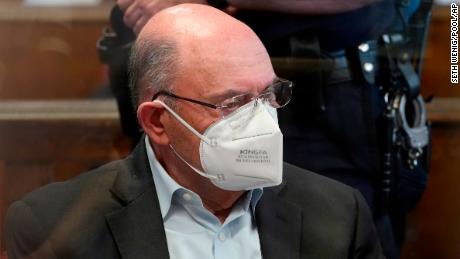Despite their suspicions, federal prosecutors did not pursue perjury charges against Weisselberg, but his past interactions with them could now become relevant to the Manhattan district attorney’s office as it seeks his cooperation in a tax fraud case brought against Weisselberg and the company last month.
As that investigation proceeds, all eyes are on whether Weisselberg might flip against his longtime boss, former President Donald Trump.
But as the federal prosecutors previously learned, any assistance from Weisselberg could be a mixed blessing. Weisselberg has denied wrongdoing in the tax fraud investigation and in connection with anything pertaining to the Cohen case.
In 2018, federal prosecutors in the Manhattan US attorney’s office prosecuted Cohen, in part for his role in paying hush money to silence women who claimed having affairs with Trump (he has denied the affairs).
In the course of the investigation, prosecutors gave limited immunity to Weisselberg, who was involved in the company’s effort to reimburse Cohen for the hush money payments, a matter that has also come under scrutiny by the Manhattan district attorney’s office.
But federal prosecutors ended up questioning their decision to give Weisselberg immunity, according to people familiar with the matter.
After they came to suspect Weisselberg lied in his testimony, prosecutors weighed whether to pursue perjury charges and, according to one person familiar with the matter, they also explored whether they could retract his immunity.
Prosecutors were skeptical of Weisselberg’s testimony, particularly his description of how the company reimbursed Cohen and categorized it in the company’s books as legal expenses, two people familiar with the investigation said. Weisselberg wasn’t the only Trump Organization official whose testimony prosecutors doubted, according to one of these people.
When prosecutors eventually charged Cohen, they noted in the charging papers that with regard to the reimbursements, “the company accounted for these payments as legal expenses” but the invoices Cohen submitted “were not in connection with any legal services he had provided in 2017.”
One hurdle prosecutors have in bringing perjury cases is proving the information was false and that the individual knew it was false when they testified.
In the spring of 2019, the Justice Department’s Office of Legal Counsel wrote a memo casting doubt on the Manhattan federal prosecutors’ application of campaign finance charges in the Cohen case, The New York Times reported, a step that was viewed by some in the Manhattan office as an effort to quash any pursuit of similar charges against anyone else involved in the episode. Others in the office, though, didn’t believe Weisselberg was vulnerable to such charges, according to one person familiar with the investigation.
Prosecutors ultimately decided against either stripping Weisselberg of his immunity or prosecuting him.
A spokesman for the Manhattan US attorney’s office declined to comment.
A lawyer for Weisselberg, Mary Mulligan, said, “Allen cooperated fully in the SDNY’s extensive investigation. The SDNY charged Michael Cohen with campaign finance and tax violations, and then closed its investigation more than two years ago.”
The Manhattan district attorney’s current investigation into Weisselberg grew out of an inquiry by federal prosecutors regarding how the Trump Organization reimbursed Cohen for the hush money payments, a probe that continued after Cohen pleaded guilty in 2018 to charges including campaign-finance crimes related to the payments. It’s not clear if federal prosecutors informed the Manhattan district attorney’s office that they believed Weisselberg lied in his testimony in their case.
In a July 2019 court filing, federal prosecutors informed the judge in Cohen’s case that the Manhattan US attorney’s office had “effectively concluded its investigations of (1) who, besides Michael Cohen, was involved in and may be criminally liable for the two campaign finance violations to which Cohen pled guilty” and whether certain people, the details of which were redacted, “made false statements, gave false testimony or otherwise obstructed justice in connection with this investigation.”
Weisselberg was among the people the office investigated for such behavior, according to one person familiar with the matter.
In the Manhattan district attorney’s case, Weisselberg and the Trump Organization itself have been charged with an alleged 15-year tax scheme stretching back to 2005 “to compensate Weisselberg and other Trump Organization executives in a manner that was ‘off the books.’ ”
The indictment focused largely on Weisselberg. In the months leading up to the charges, district attorney prosecutors repeatedly sought his cooperation as a possible way to bring the investigation closer to Trump himself.
The investigation is ongoing. Prosecutors are looking into, among other things, whether the Trump Organization misled insurers and lenders by inflating the value of certain properties on financial statements.
If Weisselberg were to try to cooperate with the Manhattan district attorney’s investigation, he would be required to be truthful in his testimony or face the threat of prosecution for perjury, in addition to the other alleged crimes for which he is being prosecuted.
Prior to being indicted, Weisselberg indicated to the district attorney’s office that he didn’t intend to cooperate, and he hasn’t appeared to change his position since being charged.
Weisselberg and the Trump Organization have both pleaded not guilty to the charges.





